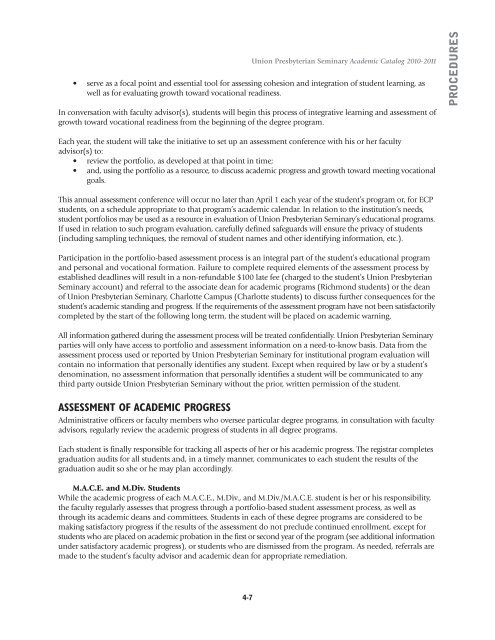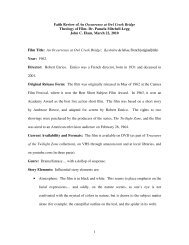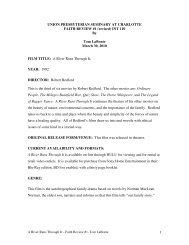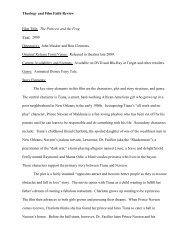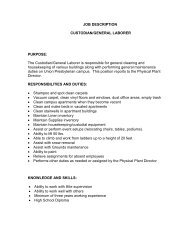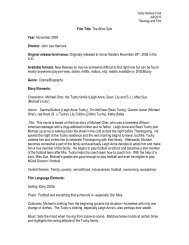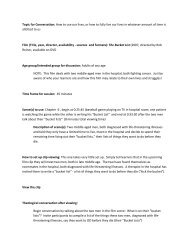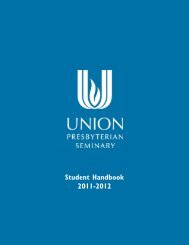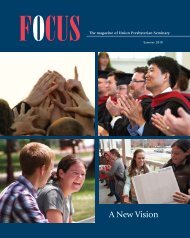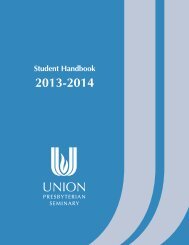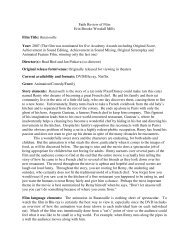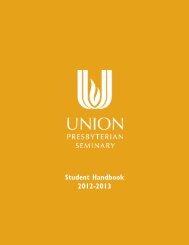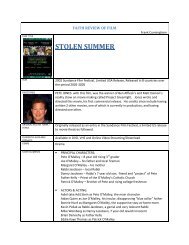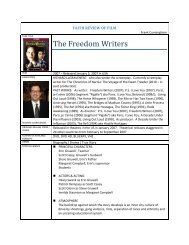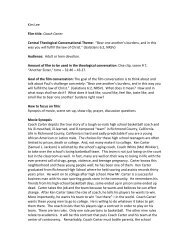Academic Catalog 2010-2011 - Union Presbyterian Seminary
Academic Catalog 2010-2011 - Union Presbyterian Seminary
Academic Catalog 2010-2011 - Union Presbyterian Seminary
Create successful ePaper yourself
Turn your PDF publications into a flip-book with our unique Google optimized e-Paper software.
<strong>Union</strong> <strong>Presbyterian</strong> <strong>Seminary</strong> <strong>Academic</strong> <strong>Catalog</strong> <strong>2010</strong>-<strong>2011</strong>• serve as a focal point and essential tool for assessing cohesion and integration of student learning, aswell as for evaluating growth toward vocational readiness.In conversation with faculty advisor(s), students will begin this process of integrative learning and assessment ofgrowth toward vocational readiness from the beginning of the degree program.PROCEDURESEach year, the student will take the initiative to set up an assessment conference with his or her facultyadvisor(s) to:• review the portfolio, as developed at that point in time;• and, using the portfolio as a resource, to discuss academic progress and growth toward meeting vocationalgoals.This annual assessment conference will occur no later than April 1 each year of the student’s program or, for ECPstudents, on a schedule appropriate to that program’s academic calendar. In relation to the institution’s needs,student portfolios may be used as a resource in evaluation of <strong>Union</strong> <strong>Presbyterian</strong> <strong>Seminary</strong>’s educational programs.If used in relation to such program evaluation, carefully defined safeguards will ensure the privacy of students(including sampling techniques, the removal of student names and other identifying information, etc.).Participation in the portfolio-based assessment process is an integral part of the student’s educational programand personal and vocational formation. Failure to complete required elements of the assessment process byestablished deadlines will result in a non-refundable $100 late fee (charged to the student’s <strong>Union</strong> <strong>Presbyterian</strong><strong>Seminary</strong> account) and referral to the associate dean for academic programs (Richmond students) or the deanof <strong>Union</strong> <strong>Presbyterian</strong> <strong>Seminary</strong>, Charlotte Campus (Charlotte students) to discuss further consequences for thestudent’s academic standing and progress. If the requirements of the assessment program have not been satisfactorilycompleted by the start of the following long term, the student will be placed on academic warning.All information gathered during the assessment process will be treated confidentially. <strong>Union</strong> <strong>Presbyterian</strong> <strong>Seminary</strong>parties will only have access to portfolio and assessment information on a need-to-know basis. Data from theassessment process used or reported by <strong>Union</strong> <strong>Presbyterian</strong> <strong>Seminary</strong> for institutional program evaluation willcontain no information that personally identifies any student. Except when required by law or by a student’sdenomination, no assessment information that personally identifies a student will be communicated to anythird party outside <strong>Union</strong> <strong>Presbyterian</strong> <strong>Seminary</strong> without the prior, written permission of the student.ASSESSMENT OF ACADEMIC PROGRESSAdministrative officers or faculty members who oversee particular degree programs, in consultation with facultyadvisors, regularly review the academic progress of students in all degree programs.Each student is finally responsible for tracking all aspects of her or his academic progress. The registrar completesgraduation audits for all students and, in a timely manner, communicates to each student the results of thegraduation audit so she or he may plan accordingly.M.A.C.E. and M.Div. StudentsWhile the academic progress of each M.A.C.E., M.Div., and M.Div./M.A.C.E. student is her or his responsibility,the faculty regularly assesses that progress through a portfolio-based student assessment process, as well asthrough its academic deans and committees. Students in each of these degree programs are considered to bemaking satisfactory progress if the results of the assessment do not preclude continued enrollment, except forstudents who are placed on academic probation in the first or second year of the program (see additional informationunder satisfactory academic progress), or students who are dismissed from the program. As needed, referrals aremade to the student’s faculty advisor and academic dean for appropriate remediation.4-7


